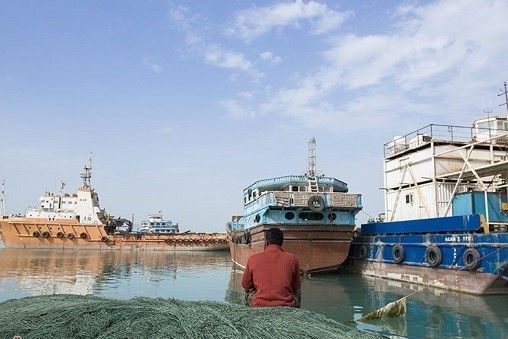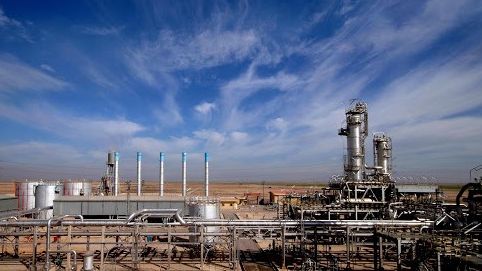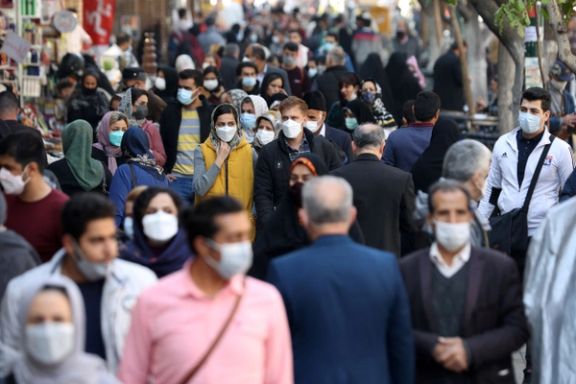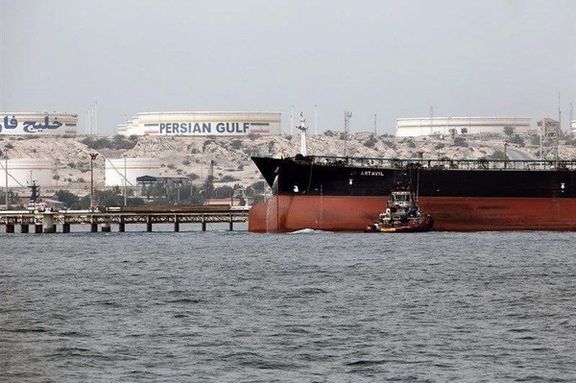Report Unveils Secret Network Of Iran Guard's Diesel Smuggling

A new investigative report has detailed Iran’s large diesel smuggling network, revealing the role of the Revolutionary Guard and private shipping companies in the illicit trade.

A new investigative report has detailed Iran’s large diesel smuggling network, revealing the role of the Revolutionary Guard and private shipping companies in the illicit trade.
that ships anchored in the Persian Gulf outside the territorial limits of the United Arab Emirates to evade detection by coast guards and wait at night for small fishing boats that deliver the smuggled Iranian fuel, a process that can take four to five nights until the tankers get their maximum load.
There are many reports on Iran’s secret network of fuel smuggling but the new investigative report offers a fresh inside look thanks to several Indian nationals who were employed by UAE-based shipping companies, which trafficked the diesel to Somalia or other destinations.
In addition to the clandestine nighttime transfers, Iranian diesel bound for international markets is also carried on tankers setting sail from Iran with the origin of the shipment forged in the Emirati port of Sharjah to make it look as it came from Iraq or the UAE.
The report said that this was a very profitable trade even before the United States left the 2015 nuclear deal and imposed sanctions on Iran. Gasoline and especially diesel are extremely cheap in Iran because of heavy government fuel subsidies. One gallon of diesel is just 4 US cents.

A business representative in Tehran has criticized the government's sanctions-busting oil barter deals with buyers like China saying Iran gets little in return.
"We had not signed clear agreements with China for bartering. We gave them oil and told them to pay in kind. In such circumstances, they give us all their inferior quality products including the pesticides that have caused so much damage to our agricultural exports," Masoud Daneshmand told the Iranian Labour News Agency (ILNA) Sunday.
US banking sanctions and international restrictions on Iran have practically cut the country off from the global financial system, making it impossible to receive cash for oil exports.
Daneshmand also criticized an agreement to receive tea from Sri Lanka for its nearly a decade-old oil debt. In late December, Sri Lanka's minister of plantation, Ramesh Pathirana, signed an agreement with the head of Iran's Trade Promotion Organization in Colombo to settle the country's $251 million debt in monthly instalments of $5 million.
Sri Lanka will release the equivalent of the $5 million in rupees which will then be paid to the country's state-run Tea Board to distribute to individual exporters of tea to Iran.
Daneshmand said Sri Lanka has no other product to barter with Iran. "They will be giving Iran second and third grade quality tea instead of top quality and we will have to accept it. This kind of barter is nothing but loss to Iran."
In a tweet December 27, prominent reformist politician Mostafa Tajzadeh called the barter agreement "victorious"for Sri Lanka and referring to Iranian officials' insistence that US sanctions are an opportunity and blessing for Iran and will make the Islamic Republic stronger, used the hashtag "sanctions are not blessing".
Iran produces around 85,000 tons of tea in the Caspian Sea region in the north and is among the world's ten top tea producing countries. Domestic production meets around 30 percent of the national consumption. Sri Lanka is the second top tea exporter to Iran after India.
Some social media users have pointed out that bartering oil for tea could increase tea imports from Sri Lanka and damage domestic tea farmers' livelihood.
There have also been reports about plans to receive payments for oil exported to India and Pakistan in kind. Both countries export rice to Iran. Ahmad Donyamali, an official of Iran's Housing Council recently said Iran was also negotiating with Chinese and Turkish companies for building affordable government housing in a possible oil barter deal oil.
Speaking to ILNA December 24, the chairman of Iran-Switzerland Chamber of Commerce, Sharif Nezam-Mafi, criticized the government's plans to increase barter transactions with other countries and pointed out that Iran needed technology which developed countries are not likely to accept to transfer to Iran through barter.
Nezam Mafi added that many Swiss companies remained in Iran after the US withdrawal from the 2015 nuclear deal, Joint Comprehensive Plan of Action (JCPOA) but most of the companies that are still active cannot transfer their profits out of Iran, pay their shareholders, or even make payments to import raw materials or spare parts due to the sanctions. "I will not be surprised if the number of these companies drops if there is no [positive] conclusion in the JCPOA talks."
Hamidreza Salehi, a member of Tehran Chamber of Commerce on 7 December told ILNA that bartering could cause serious harm despite alleviating some of the problems the country is facing in international trade. He argued that bartering would eliminate the other side's competitors and let them dictate their own terms such as demanding discounts. "We will have to make concessions for business to take place."

A conservative news website in Tehran has published readers' comments about the nuclear talks and Iran's economic crisis, that despite censorship are revealing.
The comments, if published on any website in Iran, are strictly moderated to avoid possible insult against state officials, yet they reveal how the Iranian society perceives developments reported by the media.
Commenting on how likely is a nuclear agreement between Iran and the West, one reader said on Alef website, "Clearly Iran should fulfil its commitments under the JCPOA. An agreement would be possible if Iran does so, otherwise, there will be no agreement." As the comment looks contrary to Tehran's official view, the website replied: "Let the West do it first for once."
Another reader commented: "The United States wishes to return to the JCPOA so that it could activate the trigger mechanism and return all the UN resolutions against Iran. What the Iranian people want is a sustainable long-term agreement with the West."
Yet another user said: "We, and not the West, urgently need to negotiate and to reach an agreement. It is our economy that suffers from an 85-percent inflation [in some cases], not their economy. Prices change by the hour here, not in the West. Almost everyone has come to the conclusion that what we needed in Iran is an end to sanctions rather than a change of government."
The website replied that due to the mismanagement of the economy during the past 50 years, the rise in inflation will continue even if the sanctions are lifted.
Recently, when Iranian officials admit serious problems like inflation and drought, they refer to 50 years, to include the last few years of monarchy in Iran when the economy was in fact booming.
Another reader said, "They call themselves economists and still want to raise the income tax by 64 percent. Even the current tax rate is too much for some businesses." A third user opined that "the wave of immigration from Iran is caused by high prices and inflation."
One reader summed up a sentiment often evident in social media posts by Iranians. "If you cannot solve the problem of Iran's economy, what is wrong with asking the views of some international economists? Stop coming up with temporary solutions that redouble poverty and hunger in this country and increase inflation. The people can no longer tolerate price rises."
Referring to selling government assets as a way of coping with the country's massive budget deficit, one user commented: "Please do not sell government assets to plunderers. Instead of selling government assets to corrupt individuals, take back their illegitimate wealth and punish them for disrupting the national economy."
"It is a fact that the government is confused about many things particularly about the economy. Economic figures in the government do not work in coordination with each other and it is every man for himself. However, none of them has a solution," one of the comments said.
An article on the website that said the reason why lawmakers want to impeach Minister of Industry Reza Fatemi Amin is that he has not been able to control car prices also attracted attention. One reader said that "car prices can be controlled if the government allows the import of foreign-made cars to end the monopoly of Iranian automobile makers in the market. The competition will also lead to an improvement in the quality of domestically manufactured vehicles."
Another user said that "someone should first impeach the lawmakers who wish to impeach the Minister. Their performance is no better than the members of the cabinet."

The Iranian government’s official newspaper has said that Iran sells its oil so cheap that the risk of circumventing US sanctions is worth taking for buyers.
The Iran Daily wrote that the Islamic Republic is selling its oil at such low prices that it is worth for foreign buyers to circumvent US sanctions, which carry third-party penalties for established companies.
The article said that the discounts offered are so enticing that crude oil exports have been increasing.
It said that oil sales to China in November increased by about 40 percent compared with the figure for October, reaching about 18 million barrels, equivalent to about 600,000 barrels a day.
Bloomberg reported that China allowed small "teapot" refineris to import more oil in October for 2021 and they rushed to buy more Iranian supplies. But this is a temporary change that might not last long.
However, according to Kpler, a provider of data and analytics for commodity markets, that said official Chinese data indicate China hasn’t taken any Iranian oil since December 2020. The report said supplies have often been re-branded as originating from Oman and Malaysia.
Iran's illicit oil exports go through middlemen who also take a large commission to arrange forged documentation hiding the real point of origin.

Iran’s former president Hassan Rouhani has warned the Supreme Leader over the economic perils of delaying a nuclear deal with the West, some sources have said.
One day earlier a journalist in Iran tweeted that Rouhani met with Ali Khamenei for one hour in recent weeks. So far there is no official confirmation or denial about the report.
Paris-based analyst Reza Alijani told Iran International TV on Monday that a group known as "the wise men" including Rouhani, former Parliament Speaker Ali Larijani, former conservative lawmakers Morteza Nabavi and Mohammad Reza Bahonar, and others, have warned Khamenei about the dire situation of the economy and called for reaching an agreement with the West, particularly the United States, before the economic crisis endangers the regime.
One more source who is in Iran related a similar account of the meeting.
The same group was assembled in late 1980s and urged Ayatollah Rouhollah Khomeini to end the war with Iraq and reduce tensions between Tehran and Washington to save the regime.
At the time, Khomeini disbanded the group but took their advice, admitting that it was a "chalice of poison" he had to drink.
Alijani told Iran International TV that Rouhani communicated the group's message to Khamenei in his recent meeting with him, but Khamenei also ordered the group to stop their meetings. However, it is not yet known if he accepted to consider the group’s suggestion. Nonetheless, Alijani observed that during recent days, Iran has been withdrawing from some of its hardline positions in the nuclear talks.
Alijani mentioned that Tehran has accepted to allow the UN nuclear watchdog, the IAEA to reinstall cameras in a nuclear workshop in Karaj. Tehran has also stopped mentioning its demand for lifting all US sanctions first for talks to continue, and its rhetoric about a US guarantee not to withdraw from the agreement again.
However, everyone in Iran, as well as politicians and negotiators abroad are convinced that it is Khamenei who makes the final decision about the nuclear issue and other political matters in Iran.
Alijani said that Iran is in a “state of emergency” as far as the country's economy is concerned. Nonetheless, Khamenei might insist on his hardline positions and may not accept a settlement although the West has agreed to lift the JCPOA-related sanctions and accepted to limit the discussions to Iran's nuclear program.
Under economic pressure, Khamenei has to make some sort of compromise and return the nuclear program to where it was before the 2018 US pull-out, but he might still choose the worst-case scenario of carrying on with his non-compromising positions, which would lead to “a catastrophe for the Iranian nation”, Alijani maintained.
In the meantime, Iran’s economy is in its worst situation since the 1979 revolution and the new Iranian government led by staunch hardliner Ebrahim Raisi has brought the economy to a standstill partly because six months after his election, neither he nor his government know who is in charge of the economy. His minister of economy is said to be on the verge of being impeached by the parliament for failing to sort out the crisis.

As criticism over Iran’s proposed budget echoes in local media, a former lawmaker says the top leadership has decided to reach an agreement with the West.
Mehrdad Lahouti told Aftab News, a Tehran political website that this year’s budget is not much different from previous ones in facing a serious deficit and the country's top leadership has apparently decided to solve its issues with the West.
He was was quoted on Sunday as having said that as long as Tehran does not improve ties with the world, “we cannot be hopeful about an improvement in people’s lives.”
Meanwhile, the head of the Budget and Planning Organization, Massoud Mirkazemi has written to President Ebrahim Raisi that a 10-percent extra pay in the current budget plan cannot be met because there is no money for it.
Mirkazemi has proposed to sell assets of medical universities and the government to raise money. He has admitted that targets this year for selling government property have not been met, reducing budget revenues.
Iran has faced serious budget deficits since the United States withdrew from the Obama-era nuclear agreement known as JCPOA in 2018 and imposed sanctions that have denied tens of billions of dollars in oil revenues to the Islamic Republic.
Lahouti argued that the main sources of revenue for the proposed budget to start in March 2022 are oil exports and more taxes. The budget draft is based on the projection that Iran can export 1.2 million dollars of crude oil per day next year, but the proposition depends on lifting of US sanctions.
Tehran is currently negotiating with world powers over reviving the JCPOA, which would lift the oil sanctions, but if these talks fail or are delayed it cannot sell the expected amount of oil.
Lahouti said that in such a scenario the government has to resort to borrowing from domestic markets, but he did not mention that cash has dried out and internal capital markets cannot lend billions of dollars to the government. That means the Central Bank will resort to printing money as in past years, driving up inflation that now stands close to a 50-percent annual rate.
But the former lawmaker did highlight that the government is planning to also borrow around $5.5 billion from its foreign currency reserve fund. Information about the fund is a state secret but observers agree it has declined substantially from more than $100 billion a decade ago to perhaps less than $30 billion.
Despite the unsurmountable budgetary problems, the Raisi administration has promised 8 percent economic growth, a figure Iran has never achieved before. Lahouti said that to get to that level of growth, the country would need $65 billion in foreign investment – again a figure the Islamic Republic has not seen in its 42-year existence.
But Lahouti said he believes that the top leadership has concluded it needs to solve its problems with the West, and “that is why Iran’s negotiators are in Vienna trying to reach an agreement with the West.”